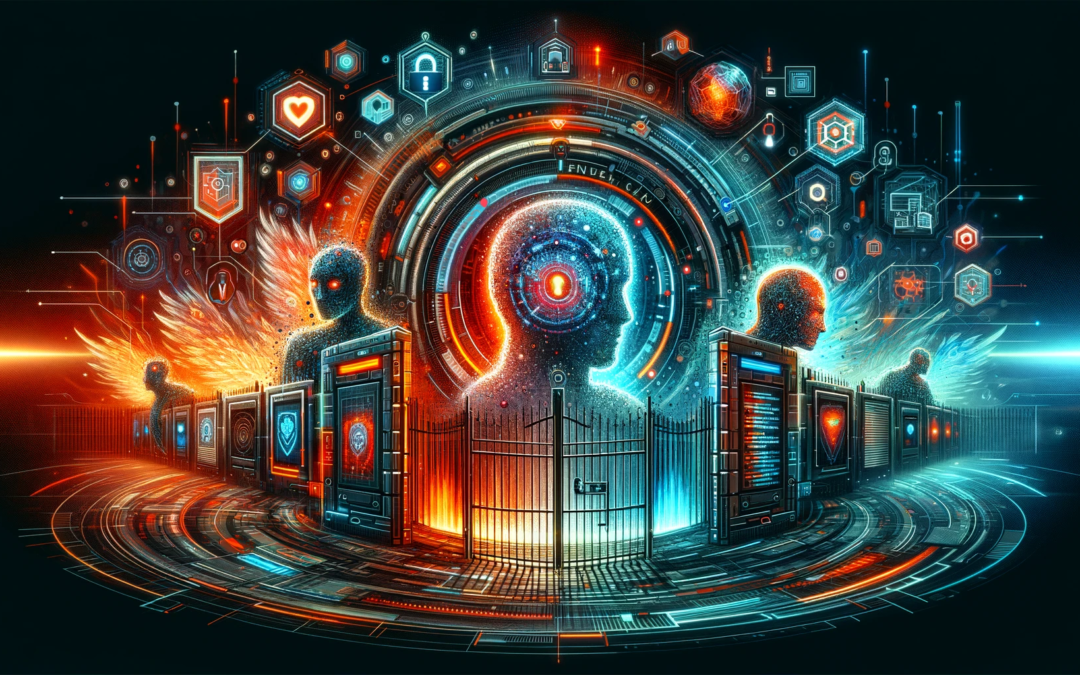Welcome to the digital age, where cybersecurity has become a paramount concern for individuals and organizations alike. With data breaches and cyber threats on the rise, the need for robust security measures has never been greater. In this blog post, we will explore the fascinating role of AI in enhancing cybersecurity and digital privacy. Strap in, because the future of digital security is about to get even more exciting!
AI in Threat Detection and Response
Imagine a cyber defense system that never sleeps, constantly scanning for threats and responding in real-time. That’s where AI comes into play. With its ability to analyze vast amounts of data at lightning speed, AI is revolutionizing threat detection and response. From identifying malicious patterns in network traffic to flagging suspicious user behavior, AI-powered security platforms are the guardians of our digital realm.
Take, for instance, AI-driven security tools like Darktrace, which use machine learning algorithms to detect anomalies and potential threats. These intelligent systems learn from past incidents, adapt to new attack vectors, and evolve alongside cybercriminals. The result? A proactive defense that stays one step ahead of the bad actors.
AI in Predictive Cybersecurity
While AI is excellent at responding to known threats, it’s equally impressive when it comes to predicting and preventing future attacks. By analyzing historical data and identifying patterns, AI algorithms can anticipate security breaches and vulnerabilities before they are exploited.
One remarkable example is the use of AI in financial institutions to detect fraudulent transactions. By analyzing customer behavior and transaction patterns, AI algorithms can identify suspicious activities and prevent fraudulent transactions from occurring. This predictive power of AI is a game-changer in the fight against cybercrime.
Challenges in AI-Driven Security
As with any powerful tool, there are challenges and risks associated with relying on AI for cybersecurity. One concern is the potential for AI to be used in malicious ways. Just as AI can be employed to enhance security, it can also be harnessed by cybercriminals to develop more sophisticated attacks.
Another challenge is the risk of over-dependence on automated systems. While AI can significantly improve cybersecurity, it should not replace human expertise and oversight. It’s crucial to strike a balance between leveraging AI’s capabilities and maintaining human involvement in decision-making processes.
Ethical and Privacy Considerations
When it comes to AI in cybersecurity, ethical considerations and privacy implications must be at the forefront of our discussions. The handling of sensitive data and the potential for increased surveillance raise important questions about individual privacy and civil liberties.
As we embrace AI-driven security measures, it’s crucial to find the right balance between enhanced protection and the preservation of personal privacy. Striking this balance requires open dialogue, transparent policies, and robust regulations that safeguard both security and individual rights.
Impact on Cybersecurity Employment
While AI is transforming the cybersecurity landscape, it’s essential to consider its impact on the workforce. As AI takes over repetitive and mundane tasks, certain roles may become obsolete. However, this also opens up new opportunities for cybersecurity professionals to focus on more complex and strategic aspects of security.
Human oversight and expertise remain critical in AI-driven cybersecurity. While AI can analyze data and detect threats, it’s human intuition and experience that can make the crucial connections and decisions that machines cannot. It’s the collaboration between humans and AI that will lead to the most effective cybersecurity measures.
The Future of AI in Cybersecurity
As we gaze into the crystal ball of digital security, the future of AI looks promising. Advancements in AI technology will continue to shape and redefine the cybersecurity landscape. But with progress comes new challenges and questions.
How will AI evolve to combat increasingly sophisticated cyber threats? What are the long-term implications of relying on AI for cybersecurity? Will AI ever reach human-level intelligence, and if so, what ethical considerations will arise? These are just a few of the questions that will shape the future of digital security.
Engaging with the Audience
We want to hear from you! Have you encountered AI-driven security measures in your personal or professional life? What are your thoughts on the potential and challenges of AI in cybersecurity? Join the conversation by sharing your experiences and insights in the comments below.
Conclusion
AI is transforming the world of cybersecurity, bolstering defenses, and raising new challenges. From threat detection and response to predictive analysis, AI is revolutionizing how we protect our digital realm. However, as we embrace the power of AI, we must navigate ethical considerations and strike a balance between security and privacy. The future of digital security lies in the collaboration between humans and AI, where human intuition and expertise complement AI’s analytical capabilities. Together, we can be the guardians of the digital realm.
Remember, the digital realm is vast and ever-changing. Let’s stay vigilant, adapt to new threats, and embrace the opportunities that AI brings to the world of cybersecurity.
Visual Elements:
– Include images or graphics showcasing AI applications in cybersecurity, such as network protection interfaces, AI-driven threat analysis, and privacy tools.
– Use infographics to illustrate the impact of AI on improving digital security measures and challenges.
SEO Elements:
– Integrate keywords like “AI in cybersecurity,” “digital privacy and AI,” “AI-driven security solutions.”
– Create a compelling meta description that encapsulates the post’s focus on AI’s role in cybersecurity.
Meta Description:
Discover how AI is revolutionizing cybersecurity, enhancing digital privacy, and raising new challenges. Explore the role of AI in threat detection, predictive analysis, and the ethical considerations of using AI in cybersecurity.
This blog post offers insights into how AI is becoming an essential tool in cybersecurity, sparking interest and discussions about the future of digital security in the age of advanced AI.










